SPLATOON 3 AND THE IMPORTANCE OF STAYING FRESH
[OPEN SPOILERS AHEAD!]
so, funny story - i recently came down with a case of COVID-19. thanks to the absolute miracle that is modern medicine, i've been vaccinated and boosted and it absolutely made a difference in how i was able to recover. there was one day when i felt like absolute garbage, and then, beyond that, an almost two-week period where i felt more-or-less fine. the problem, however, is that a person who feels more-or-less fine can still test positive for COVID, and that novel little coronavirus was a real stubborn little guy sticking around in my nose. my family, graciously, offered to pay for a game of my choosing, as a present for such trying times and as a way to pass the days while i waited to finally test negative. there was really only one option in my mind - i don't know how true this is, but it certainly felt like there weren't many video games currently out in September 2022? regardless, even if the market was crowded, i think i would have gravitated to a single choice anyways. normally, this kind of offer would paralyze me with indecision, but there was a metaphorical old friend i felt like catching up with.
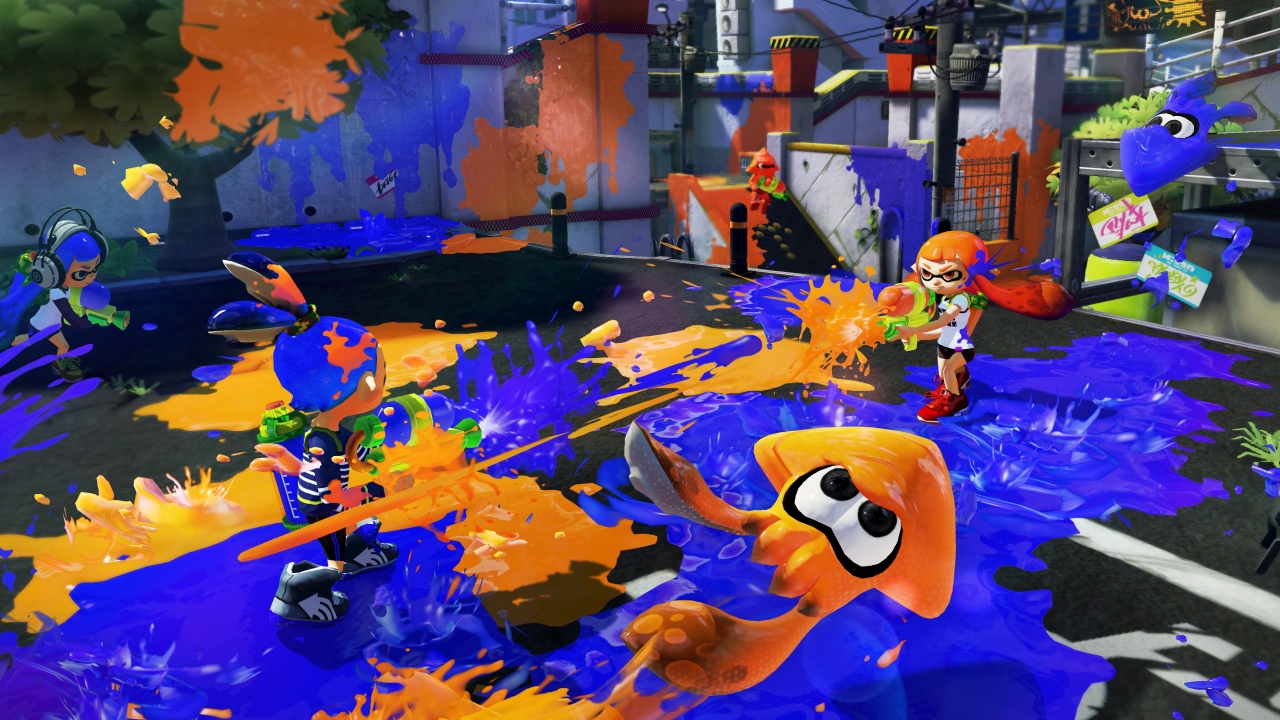
in case you haven't engaged with video games in the last seven years, let me introduce you to Splatoon, and go over some of my own history with these games. Splatoon is a third-person shooter developed by Nintendo built around a core mechanic of painting terrain. a whole cavalcade of charmingly makeshift weapons from water guns to massive paint rollers can be used to lay down colorful ink that you can then swim through. the game's main casual multiplayer mode, Turf War, determines winners not on kills, but on the percentage of ground your team has covered. there are several other modes that play around with these mechanics, including a single-player story mode and, as of later entries, a PvE horde mode, but that's the most basic summary of Splatoon's mechanics i can give, and it's about the amount of introduction we got when Nintendo debuted the game at E3 2014.
i still remember that announcement incredibly vividly. 2014 was a weird time to be 'into' Nintendo. we were deep enough into the Wii U's lifespan to know that things weren't looking so hot, and i remember a real sense of stagnation when it came to Nintendo's output. it never got so dire that the brand seemed like a dead end - the 3DS was picking up momentum with games like Animal Crossing and Pokémon, and we were due for a new Super Smash Bros. by the end of that same year - but it certainly wasn't the best of times either. looking back on E3 2014 for research for this article, i'm kind of shocked at how much got announced there, especially given what i remember latching onto. this was the same event that gave us our first look at what would become Breath of the Wild, Mario Maker and the ever-present line of amiibo figures that would become a staple feature for almost every first-party game over the next several years. i don't remember any of that stuff being 'the big announcement' of that year, though.
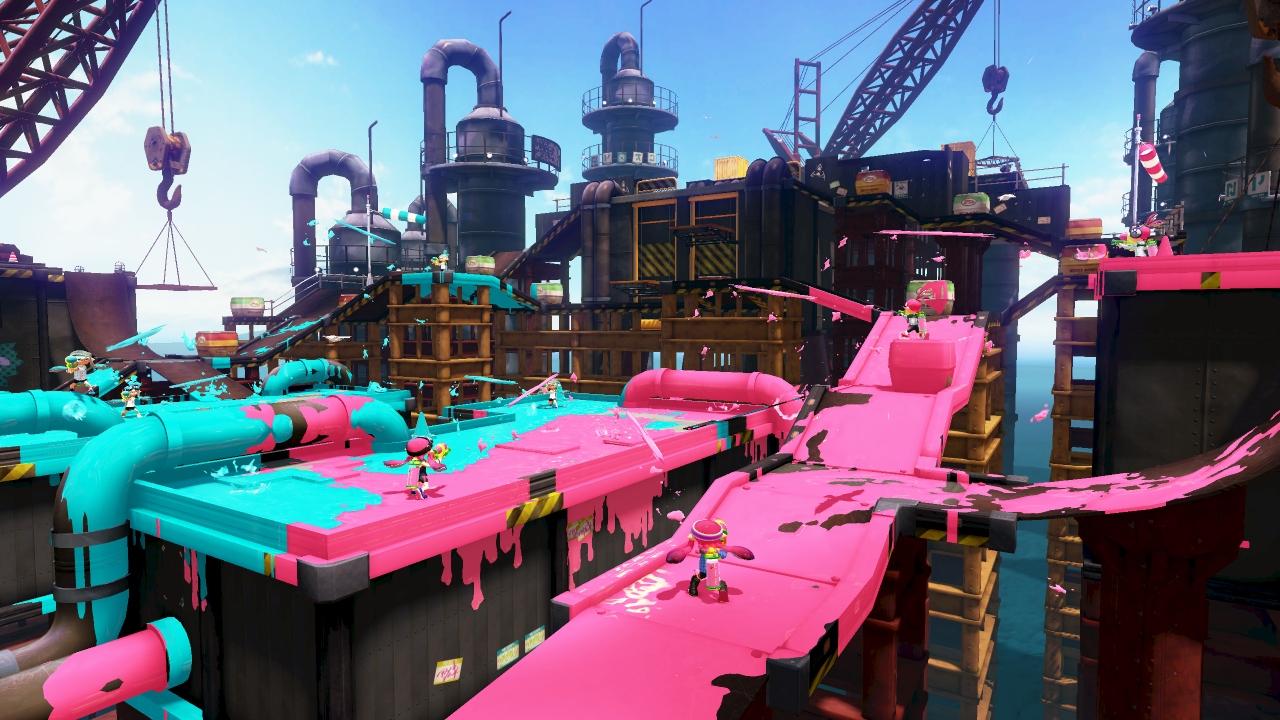
no, the game i latched onto the most was Splatoon. Nintendo hadn't launched any major new IP in a decade, and all of the sudden, here was something that seemed completely different on multiple fronts. aesthetically, the game had an immediate visual and musical appeal that made it stand out, and mechanically, it seemed so far outside of Nintendo's wheelhouse, tackling the pitch of a multiplayer-focused online shooter with their signature light-hearted fun. a lot of people will point to 2016's long-form showcase of BotW as the most memorable usage of Nintendo's showfloor 'Treehouse' streams from E3, but i still remember so distinctly the amount of time they spent showing off their early demo of Splatoon. even with only one map and one set of weapons, the concept stood out to me as something so engaging and exciting, intuitive and full of potential mechanical depth. i was telling anyone who would listen about how Splatoon was the smartest thing Nintendo had done in years and how it needed to be given the star treatment to make sure they understood the importance of fostering interesting new games.
as Nintendo took towards Tumblr as their social media platform of choice to promote Splatoon, i kept up with every morsel of information i could get my hands on, especially once we started seeing what the game's single-player component would look like and the worldbuilding that would follow. in May 2015, about a year after its initial reveal, Splatoon landed on Wii U and was an immediate hit, as much as any game could be a blockbuster when tied to hardware like the Wii U. i remember buying the game as soon as i could, having to navigate through the absolute hassle of merging a few Nintendo accounts along the way to make sure i was ready for online play, trying to explore every nook and cranny of its single-player content.
so, the game is out. it exists. is it as fun as i thought it would be? yes! with caveats.
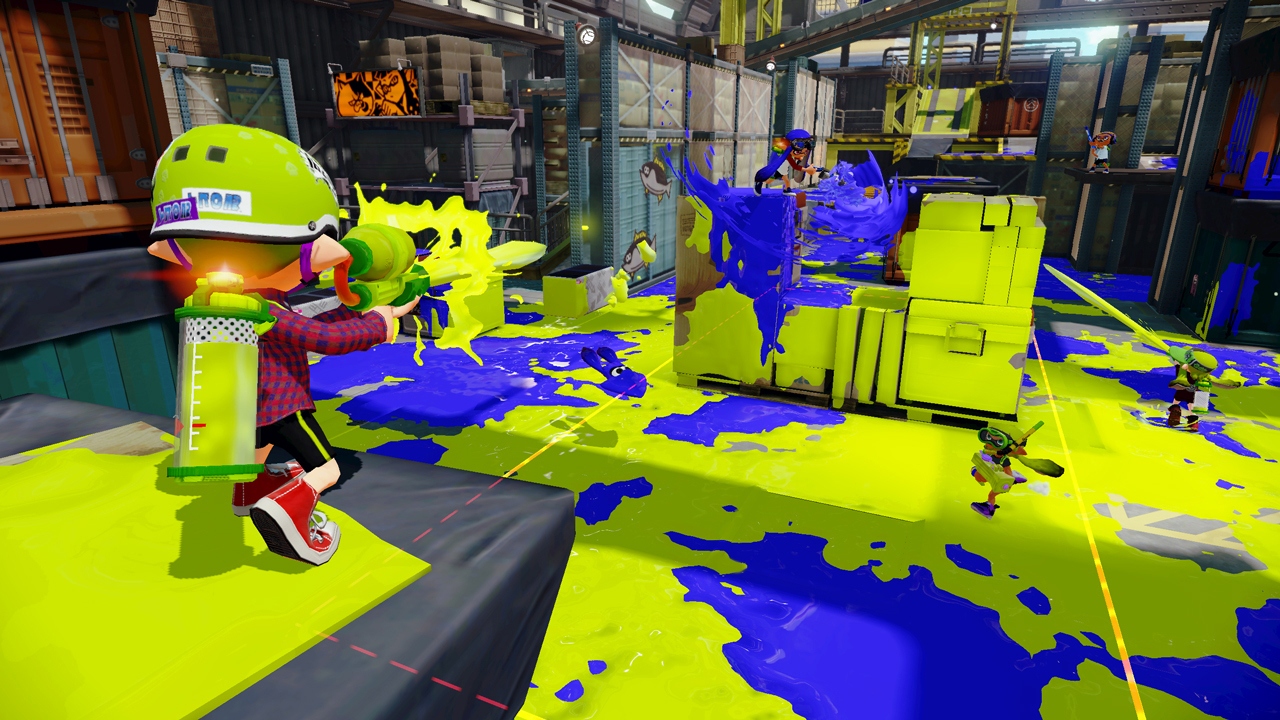
even eight years after that initial showcase, i still think Splatoon is an incredibly clever game worth praising in its design. i'm someone who already played a lot of shooters before Splatoon (namely the Halo series) and somehow, i find that this silly squid game from Nintendo conveys even more competitive intensity than the traditional scoreboard of other multiplayer games. the bright, bold, colorful ink provides immediate visual feedback about how you and your enemies are performing, stripping away precise numbers until the very end of the match and instead letting you intuitively focus on things like holding down chokepoints and quite literally gaining ground on your opponents. being able to use this same ink as a mobility tool only increases the appeal, keeping you in a constant frantic loop of movement while still giving you a very clear tactical goal to wrap your head around. there are two major gripes, especially with the original game, that do end up holding back my enjoyment to some extent, though.
the first is the game's unique rotational approach to its maps - Splatoon launched with five stages to play on, but unlike, say, every other multiplayer game on the goddamn planet, you can't actually matchmake into any of these maps all at once. no, Splatoon rotates its stages every four hours, and only offers up two at a time. this system has always seemed incredibly backwards to me - interviews with developers imply a sort of sense of ownership about what's 'fun' about Splatoon and a firm hand over how people are supposed to engage with the game. i admire anyone who's willing to put their foot down about the art they make and say that, as a creator, they know their creation well enough to make strong decisions, but this is a case where i personally don't gel with the decision being made. it was codified pretty early into the history of online multiplayer that you can just let people queue into a mode and offer up a grab bag of all the content you've made, and that works out pretty well for everyone else. Splatoon's map rotation can be an active hurdle to engaging with it, particularly if you just don't want to play what's on offer at the moment. the game also essentially grinds to a halt at these four-hour intervals to show you an in-universe news broadcast that recaps what's currently available - the writing is certainly charming, but it can severely interrupt pacing depending on when you're firing the game up.
the second gripe is with how Splatoon weaves player expression together with stat boosts. the world of Splatoon is one obsessed with 'freshness', one facet of which being fashion, and the game offers up a ton of fun clothing for you to personalize your Inkling avatar with, with daily rotating shops providing a plethora of options. the friction with this system is that each piece of clothing comes with associated abilities - one main ability, and anywhere from one to three 'sub-ability' slots. the main ability will be locked in when you receive the equipment, and as you play, it will accumulate experience, with its sub-abilities being randomly rolled once a certain threshold is met.
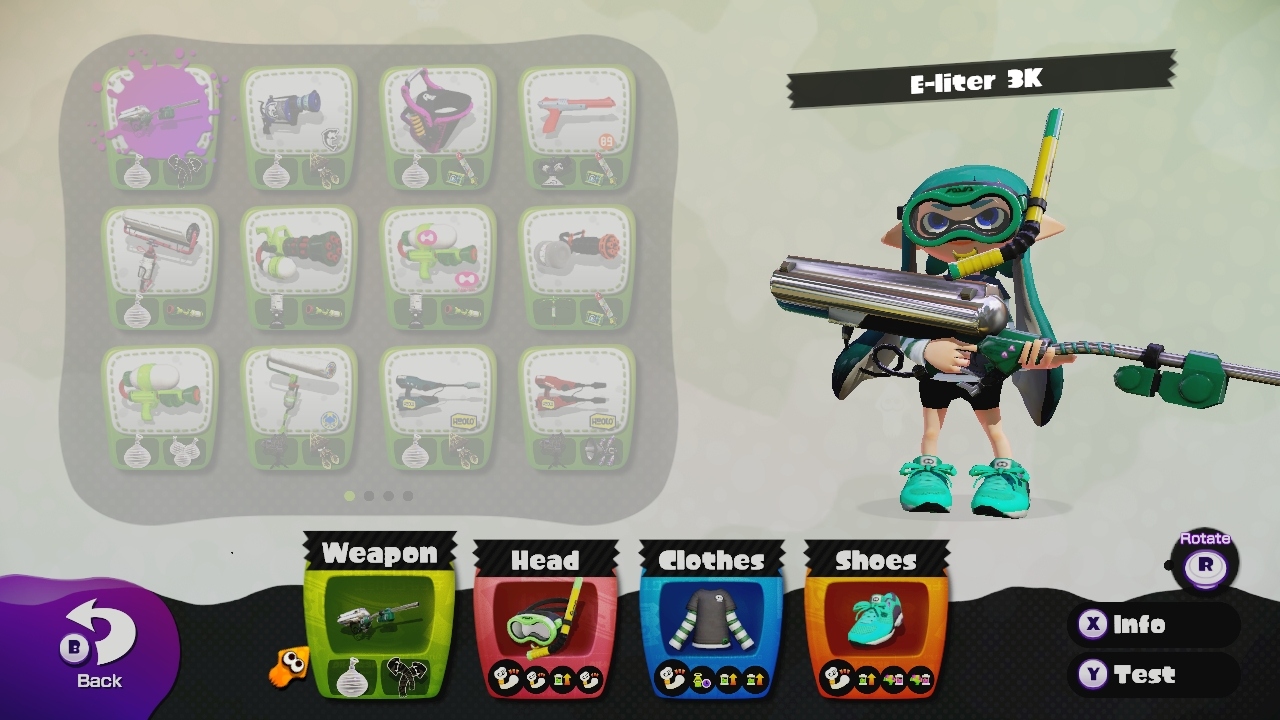
i am a complete and utter sucker for character customization in games. hand me a character creator and i will absolutely fawn over its details for hours before even diving into the actual gameplay. Splatoon's points of customization aren't the deepest - for the first game, you're effectively limited to choosing one of two gendered designs and swapping out headgear, shirts, and shoes - but the game shines in how the equipment itself is designed, drawing from streetwear and creating a charmingly messy aesthetic. the world of the game is constantly encouraging you to express yourself and mix and match and find a personal style. the problem, then, is that there's a whole other layer to choosing your clothes, determined by abilites that you're fairly locked into. do you like this pair of sneakers? well, you better hope they have an ability you want on them, too, and those sub-slots better roll well. this issue isn't exactly omnipresent; you certainly have the option to not worry too much about abilities, as they're only ever incremental stat boosts, and there is a rerolling system for the sub-slots, albeit one that requires quite a bit of grinding. hell, maybe you'll accidentally stumble into something you really like by trying to match together disparate elements. ultimately though, i feel like it's antithetical to Splatoon's 'freeform fashion' vibes to then turn around and tie an element of player performance into what you might choose to wear.
complaints out of the way for now, i do remember playing quite a bit of Splatoon - i don't have the numbers right in front of me, but i certainly put quite a bit of time into it. one odd gap in my Splatoon experience, though, is that i never participated in one of the game's many Splatfest events. i certainly heard about them, but i never found myself participating in one, even when they started doing promotional tie-ins and the very first one happened to be themed around one of my biggest hyperfixations, Transformers. Splatfests, for those unfamiliar, are limited-time weekend events where players can pick a team based on a hotly debated question - cats vs. dogs, burgers vs. pizza, etc. - and by playing in Turf Wars (with an enforced ink palette tied to the event theme) earn points for their team, being rewarded with the Super Sea Snails used for rerolling sub-abilities at the end of the 24-hour period. i've heard nothing but positive things about the Splatfest experience, in terms of how it unifies the player base in friendly competition and puts a fresh coat of paint on the game's Inkopolis Plaza hub, but the window on these events was generally only a day long and i guess i just happened to be preoccupied one way or another whenever the opportunity came up.
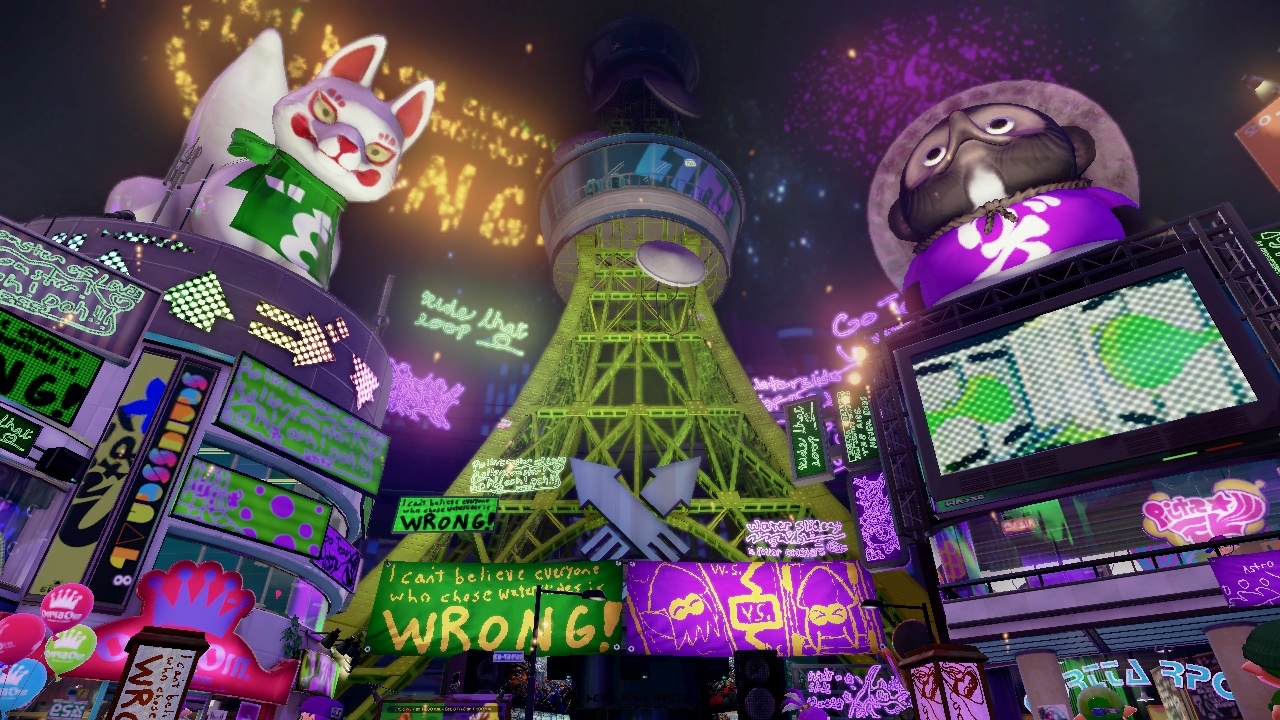
post-launch support for Splatoon was extensive, with one of these Splatfests being held once or twice a month throughout the game's active lifespan. new content started arriving only a few weeks after launch with new weapons and stages being added, and the game received a ranked mode with a variety of new, more competitive objectives in play. i remember my time with Splatoon being fairly short, probably to the extent that i simply played so much so quickly that i burnt myself out before a lot of the game's later updates. even when i was away from the game, though, i still maintained a lot of fascination with it, and evidently, so did the audience at large, because Splatoon absolutely skyrocketed in popularity. according to Wikipedia, it took only a year for it to become the most successful new home console IP in Japan since Wii Sports, across any of the three major consoles. it got so big that Nintendo ran live concerts for the in-game idols, the Squid Sisters, projecting them live on stage to perform the music from the game at multiple events throughout 2016.
ultimately, though, Splatoon was still a Wii U game, and especially past its launch, people were keen to look forward to what Nintendo had up its sleeve next. one of the very first games shown off in the reveal of their next console, the Nintendo Switch, was Splatoon, and the inclusion of this new footage combined with some perhaps slightly misinformed leaks gave the impression that perhaps the Switch would be receiving a port or 'deluxe edition' of Splatoon. clarification came at the massive Switch presentation in January 2017, confirming that the game was, in fact, Splatoon 2, a full sequel to the original. the game would arrive later that year in July, bolstering an already stacked year for Nintendo games and sending the series to even greater heights of success and appreciation.
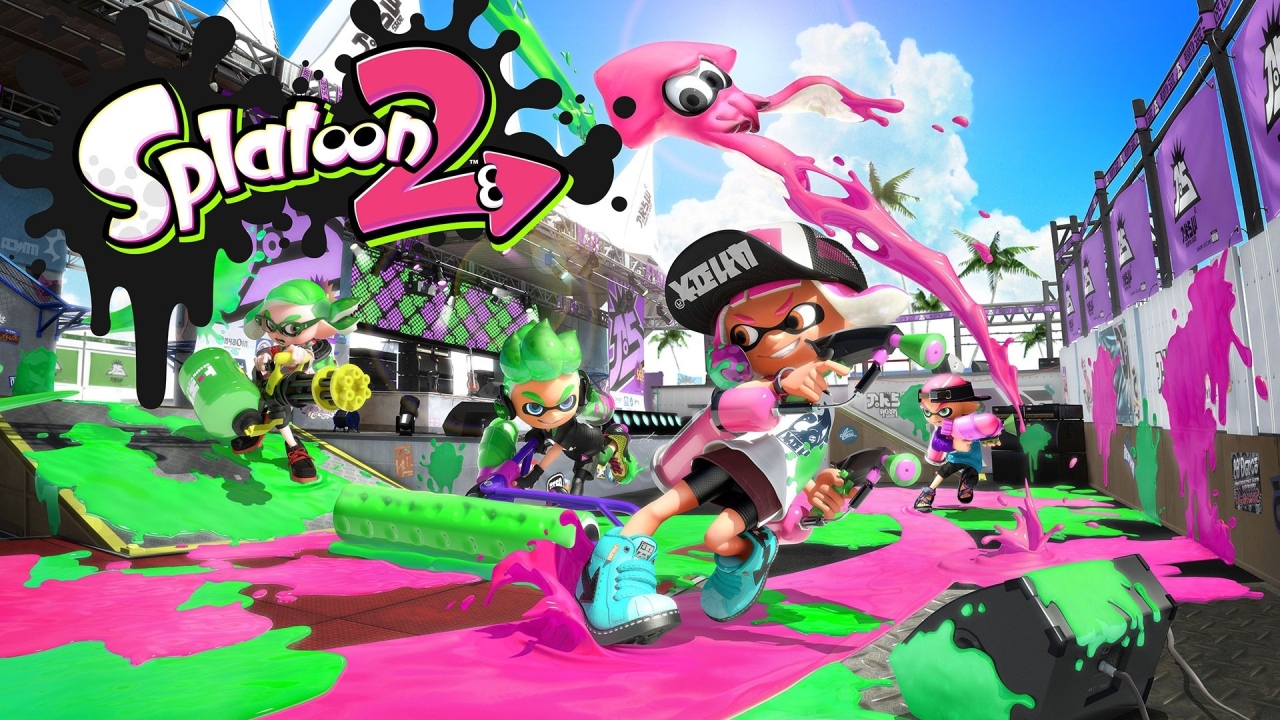
i don't have a whole lot to say about Splatoon 2, because i did not buy it! whoops!
it was, indeed, a VERY stacked year for Nintendo games. Splatoon 2 was coming out in a window right between Breath of the Wild and Super Mario Odyssey. even with all its refinements and new additions, it did look very much like the Splatoon i had bought only two years prior, and the sequel seemed to reaffirm that all the things i didn't like about map rotation or character customization were non-negotiable parts of the game's DNA, very intentionally designed rather than being pitfalls that might get cleaned up for a second attempt at the concept. i certainly kept up with Splatoon 2 and appreciated it at a distance, but to this day i have never played it and i'm not quite sure i'll ever jump at the opportunity unless i can find it exceptionally cheap.
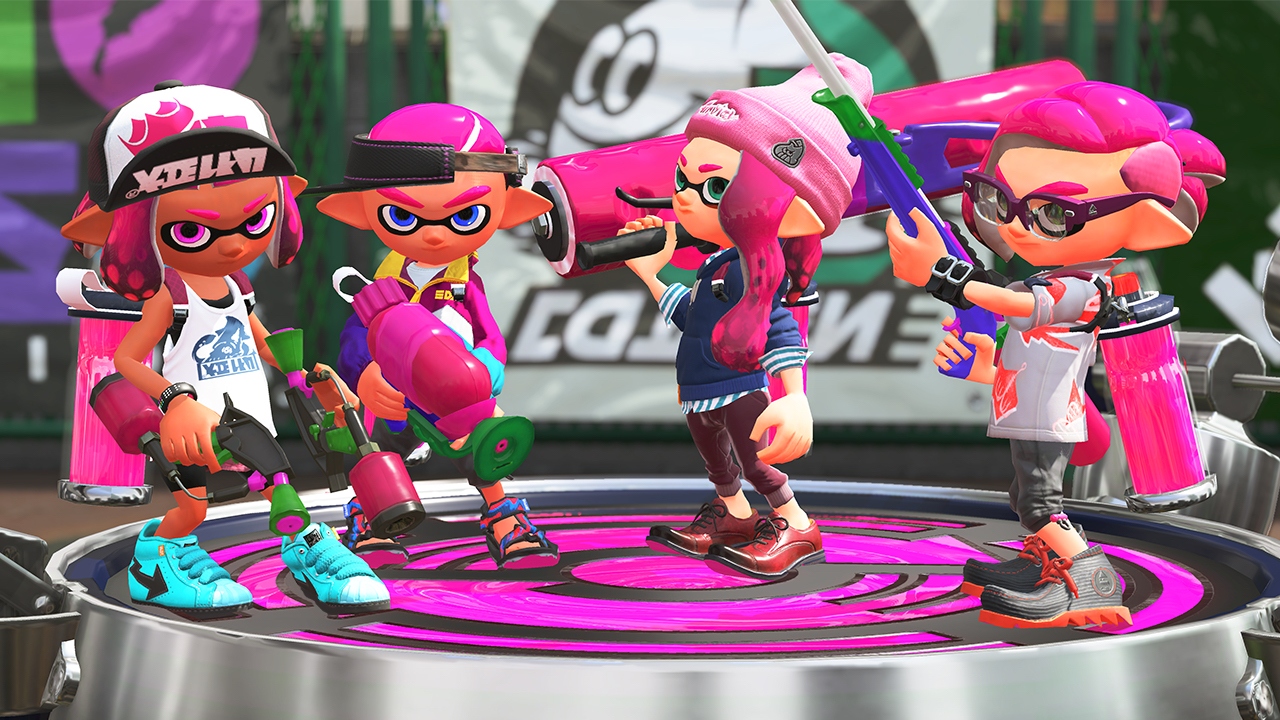
even as someone who never touched the game, i can tell you Splatoon 2 kept the momentum of the original going, introducing a whole new set of arguably even more beloved idols and bringing the game to a much wider audience by nature of being on a much more successful console. in only a few short years, Splatoon as a franchise was up there with the classics as a pillar of Nintendo, and Nintendo was fully in on it too, promoting the game heavily and making sure everyone knew how much they valued it. it was everything i could have hoped for when i was shouting about the E3 2014 demo from the rooftops. support for Splatoon 2 extended even further beyond what the original game got, even gaining a full-scale expansion to its single-player story that focused on the game's new characters and finally fulfilled the long-standing hopes for playable Octolings in multiplayer.
ultimately, the game's active support came to an explosive finale roughly two years after launch in July 2019, with its final Splatfest being labelled as 'Splatocalypse'. the story of Splatoon 2 was directly influenced by the final Splatfest of the original game, where players chose their favorite Squid Sister, but Splatoon 2 was raising its stakes even higher with a question of chaos vs. order. even without direct confirmation from the developers at the time, it was immediately apparent to anyone paying attention that this final live event wasn't just a sendoff for Splatoon 2, but a moment of player participation that would guide where the next installment of the series was heading. even as someone who never participated in these events, this level of meta-narrative interactivity is an utter treat to watch unfold, and in the end, when chaos won out, i couldn't help but be a little excited for what influence that might have on a third game.
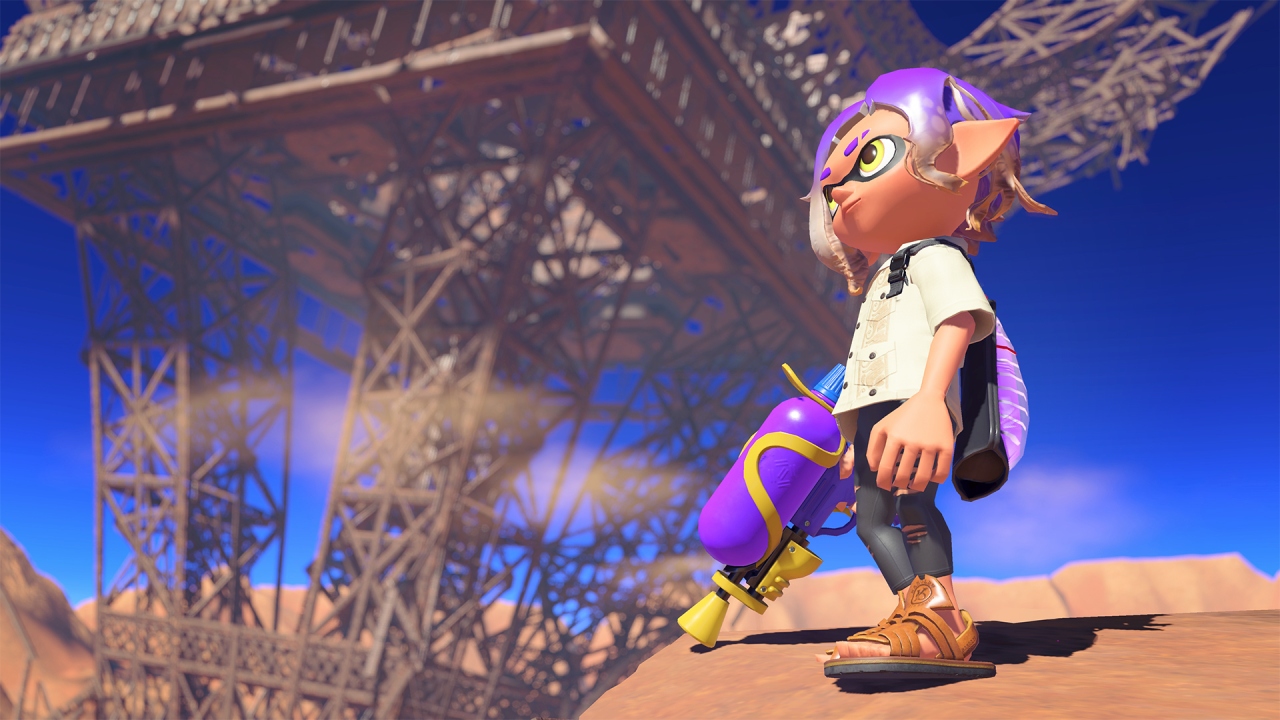
almost another two years would pass before we got our first glimpse into what that influence might be, with the announcement of Splatoon 3 coming in February 2021. the trailer left an immediate impression with its desert setting, inverted Eiffel Tower, and the debut of new elements such as expanded character customization and a new bow-like weapon. at this point in the cycle, i had more-or-less resigned myself to how i felt about Splatoon - i was very excited to see where things were heading and what a new game would bring to the table, but i felt like the odds of me actually playing it were fairly low. as its release in September 2022 drew closer, i still held these same feelings, skipping out on the game's free demo and pretty openly looking up story spoilers because i simply thought that was how i would engage with Splatoon for the foreseeable future.
then, y'know, COVID-19, family, etc., see above.
to some extent, yes, i chose to pick up Splatoon 3 because there was nothing else out, but it's also something of a pragmatic decision. i know there's things i like a lot about Splatoon, conceptually and spiritually, but i also know there's some major enough hurdles that i would have a hard time convincing myself to make the initial $60 investment myself. it is, in a sense, the perfect game for me to stumble into receiving, because i can be assured i'll have a good enough time with it to ask about it. what i didn't expect, though, was how much i've earnestly fallen back down into the Splatoon rabbit hole, full-fledged, as if it's 2015 once more.
one of the most obvious things that draws me in is that, while the major foundational issues i had with the original game are still present, they've been mitigated down to a point where their influence on my enjoyment is much smaller. maps still rotate, yes, but the schedule for these rotations has been cut in half to 2-hour windows, and thanks to the ranked modes feeling much more accessible than ever, there's substantially more variety in what's available at any given time. i do still find myself running into situations where a good map rotation lands at a time when i'm too busy to play, or vice versa, but there's enough going on that it's easy to find other ways to engage with the game. the broadcasts at the start of each rotation have also been made much less intrusive, able to be seen as ambient dialogue in your HUD while you prepare to match up. equipment abilities are also still present, but have been made much more flexible. you can now gain ability chunks that can be used to replace abilities manually, including an item's main ability - it still comes at a hefty cost, but the mere presence of these systems makes me feel much more comfortable in building out my kit.
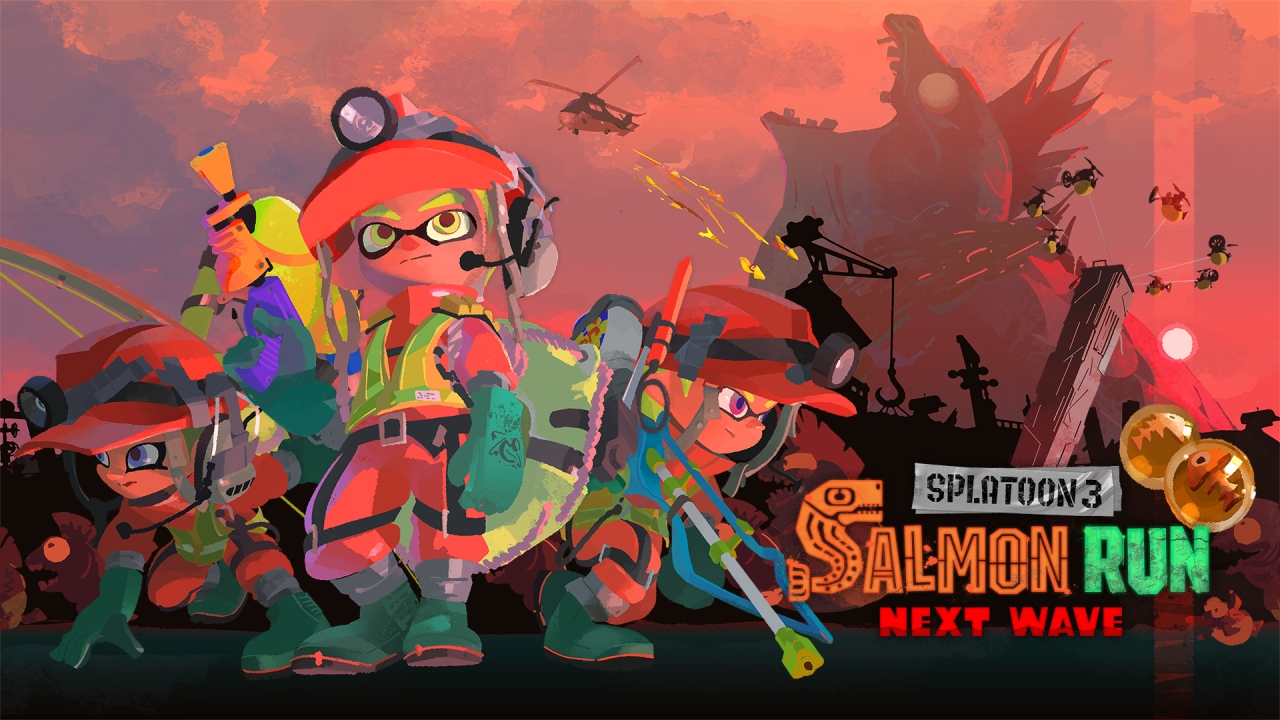
another major addition that's happened in the years between my forays with Splatoon is the introduction of a new player vs. enemy mode, Salmon Run. this mode was introduced in Splatoon 2, and in that game, was on an even harsher rotational schedule than the main multiplayer, sometimes fully closing down and being unavailable to players. hearing about that level of selective availability was a pretty strong factor in me not picking up the second game, and hearing that it was being made available 24/7 for Splatoon 3 was, conversely, a point towards perhaps giving the series another fair shot.
in the three weeks or so i've owned this game, i have become utterly enamored with Salmon Run. it's far from perfect - it perhaps suffers the most from the game's rotational systems, because the weapons provided to you are locked into these 40-hour windows, and as of this writing, i kind of detest one of the mode's three available maps, so at least 33% of the time, there's some level of damper on my enjoyment. what keeps me coming back despite these hurdles is how damn fun the gameplay loop is. it can get insanely frustrating when the game throws some of its less finely balanced options at you, but the rhythm of firing up a round, seeing what modifiers the game throws on your experience, and working with your team to defeat wave after wave of Salmonid bosses makes the whole thing worthwhile. yes, i will swear like a sailor under my breath when the game throws round 1 high tide Glowflies my way, but i've put just as much energy into cheering over a barely-clutched victory, and getting my first defeat on the King Salmonid bonus round at 2am was one of my favorite nights spent gaming in a long while.
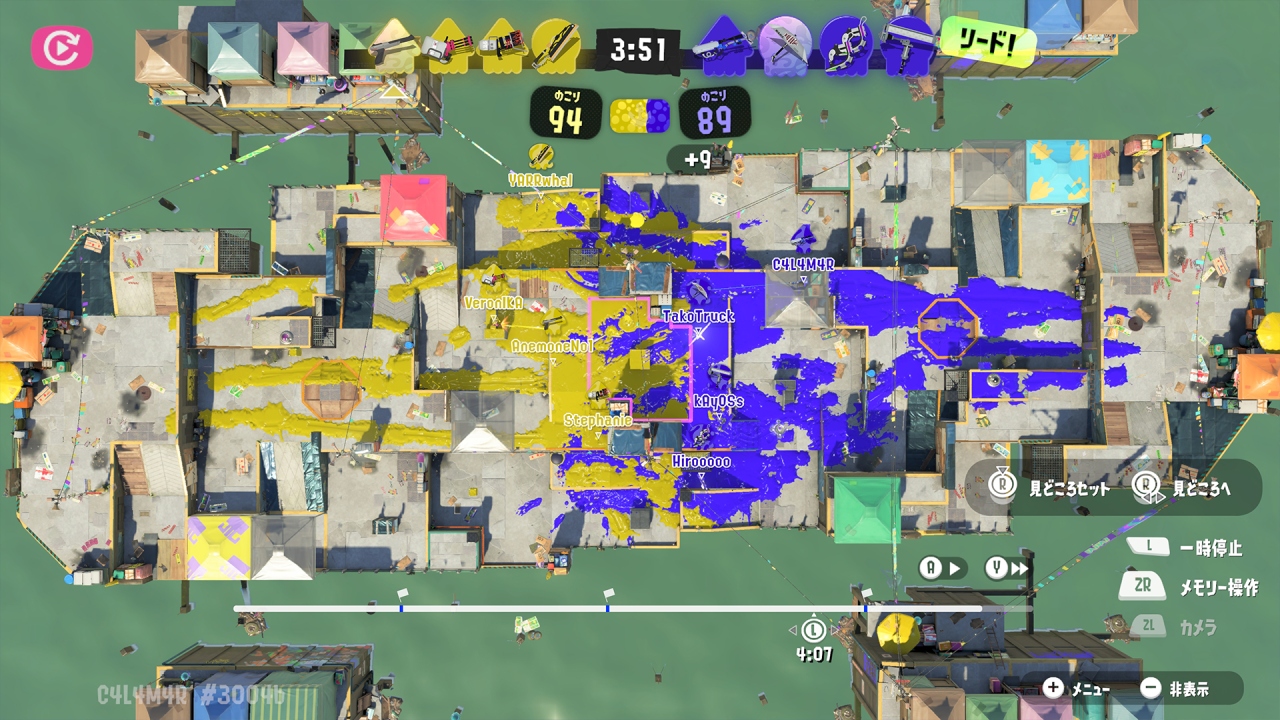
of course, the game's signature PvP is still as good as ever. i already gave you the whole spiel once, but again, i really do think the Turf War concept is an incredibly smart bit of game design, and with two prior games having been spent refining those ideas and introducing new weapons and maps, Splatoon 3 gets to reap the benefits of having an incredibly diverse backlog of tools you can mess around with. i've found myself swapping back and forth between an Inkbrush and a N-ZAP '85 (mostly depending on how much i feel like hurting my finger with button mashing for the day) but i could see myself picking up almost any of the game's various weapon classes. one of my favorite aspects of Splatoon has always been how the weaponry recontextualizes everyday objects for such a unique purpose, and this game offers up this kind of ramshackle aesthetic all over the place, with bows made out of fishing rods and entire washing machines being carried as frontline 'sloshers'.
another aspect i've always loved about Splatoon is the distinct world they've built, and how they continue iterating on it - even when i was away from the game itself, i still kept tabs on the ongoing saga of the game's lore. i recently read over some promotional interviews with the development team, and one thing they emphasized quite strongly that helped me put my finger on why i love the world of Splatoon was that unlike many other Nintendo properties, Splatoon is a world that's developing and growing at a real-time pace. Mario will never be all that concerned with the passage of time, Link will always be in some new iteration of the same classic tale, and Samus has quite the saga, but it's been told out of order and for the majority of my time spent being alive and playing video games, fans were waiting for even the slightest bit of movement forward until the release of Metroid Dread. Splatoon is different - it takes place in a world very different from our own, but just like in our world, seven years have passed over the course of this franchise so far.
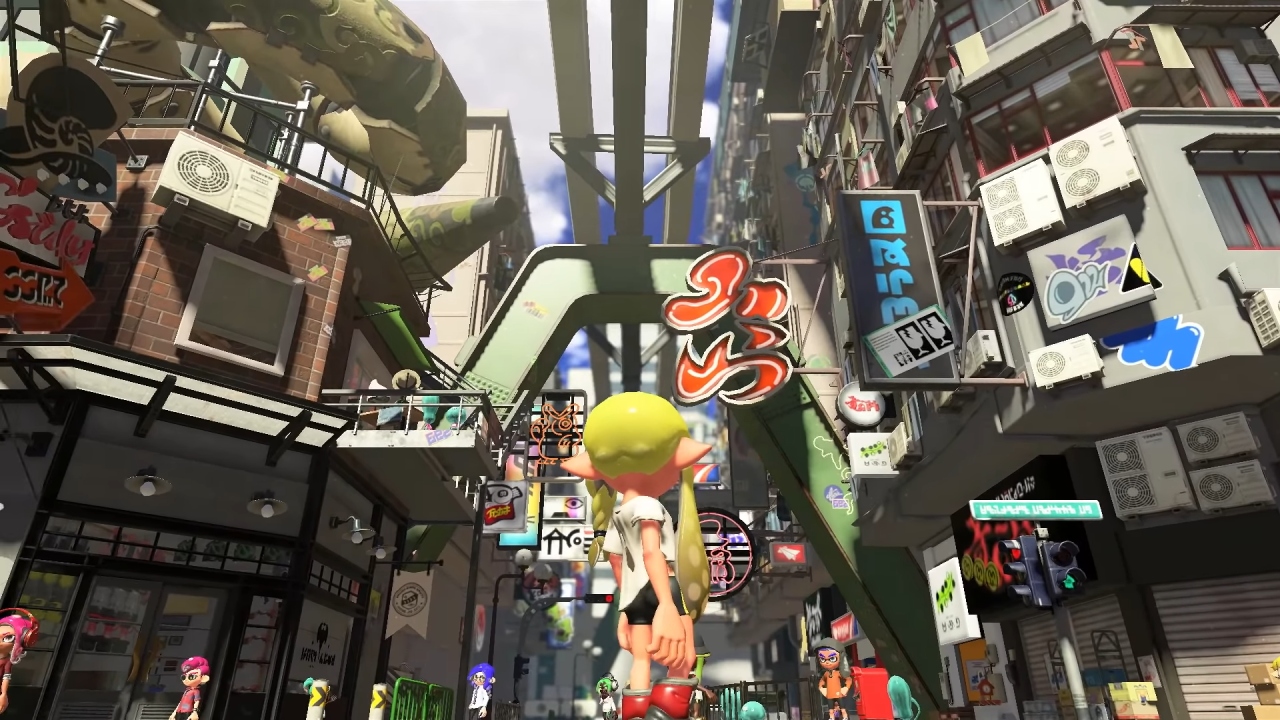
seven years is honestly quite a bit of time, and for as much as Splatoon 3 is still very much like its predecessors, it wears that march of time on its sleeve. the chaos vs. order Splatfest did, indeed, shift Inkling culture; while the first impressions from the game's reveal might have made me guess at a Mad Max-style wasteland, the game implements the theming in a lot more subtle ways too. the new hub area, Splatsville, is a much more hectic town than Inkopolis, with a less organized layout that encourages exploring and walking through tight alleys, with the whole space being nestled in a tight corner surrounded by apartment complexes. it's much more of a cultural melting pot too, with the fashion skewing towards lots of kitschy patched-together fabrics and the game's new idol trio, Deep Cut, bringing together three distinct musical styles for their tracks. the chaos of Splatoon 3 doesn't feel like the game skewing unnecessarily dark with its theming - it's a frantic blend of all kinds of elements all making a mess on the same canvas, in a way that feels very distinctly celebratory and fun.
another aspect of Splatoon that's subject to the real progression of time is its distinctive soundtrack. as far back as the first game, the developers have put a surprising amount of thought and care into the culture around music in the world of Splatoon, creating different in-universe bands who each have their own style, their own consistent vocals, and, as the games have progressed, their own interpersonal drama. Squid Squad, the band behind some of the original game's most iconic tracks, split up before the events of Splatoon 2, and now, in Splatoon 3, their members have reunited minus their bassist to form the new group, Front Roe. meanwhile, one of those very same tracks, Splattack!, has been given a rougher, more punk rock cover by newcomers C-Side. none of this is pushed into the players' face - it's almost all supplementary material, meant to flesh out the background of the world. you don't have to care about any of it at all, but i do, because this game's soundtrack is amazing and being able to identify specific artistic styles and how they've evolved over the last seven years is a fantastic bit of seamless worldbuilding.
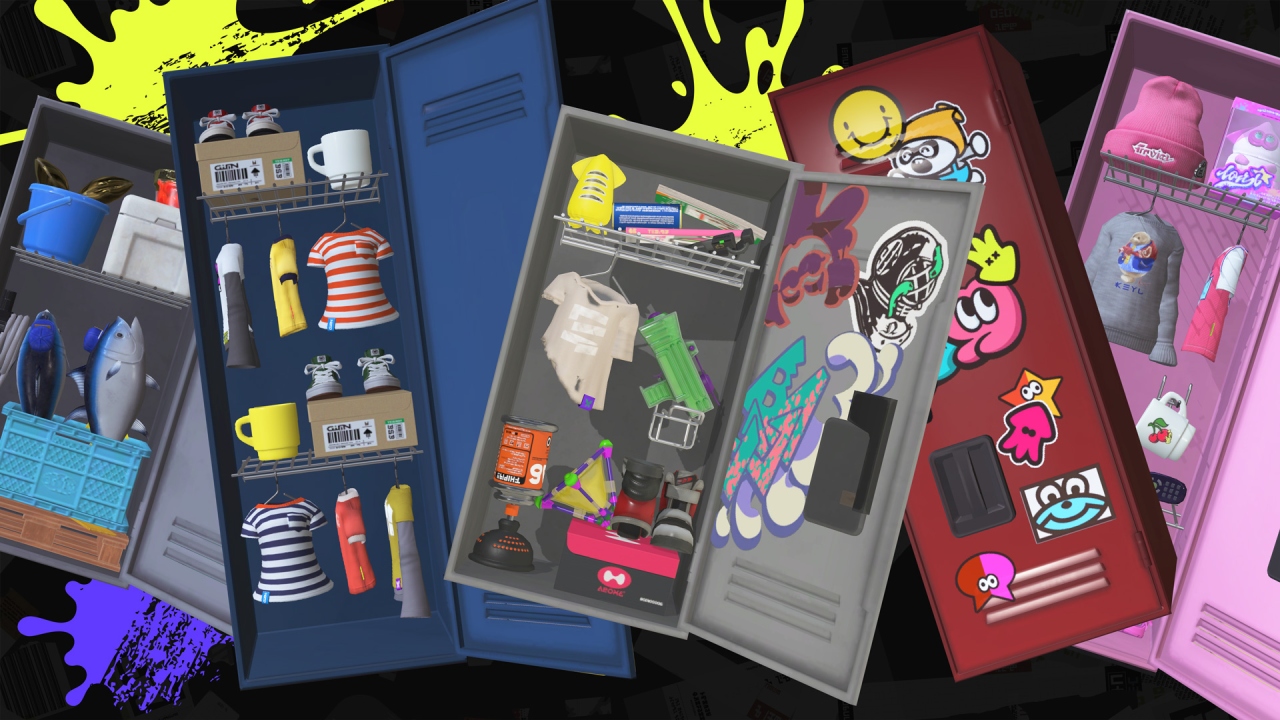
one aspect that helps tie all this deliciously subtle worldbuilding together is a particularly addictive new feature introduced for Splatoon 3, the locker room. this is, again, something totally optional to the player, but there's now a section just off the side from where you enter multiplayer where you can personalize your own locker, and look through the lockers of other players you've recently battled with. i'm sure there's people out there who are fairly cynical about the locker, or who just don't really think about it, but i absolutely love it. you can use it to display your favorite weapons or clothes, deck it out in all kinds of stickers, or purchase all sorts of miscellaneous decor from Hotlantis, ranging from skateboards and crates to rubber monster toys and what i can only describe as 'squid Furbys'. one of the core appeals of Splatoon, the message i feel like it's always tried to carry, is self-expression and embracing the messy and eccentric. the locker is kind of mechanically pointless, sure, but it's also kind of the entire point of Splatoon summed up into an addictive little corner. i'm grinding out my rank not to earn new weaponry or bragging rights, but to expand my little corner where i put my manga and hang up my Inkbrush. it is perhaps the clearest window the game offers you into the unique counter-culture the developers have put so much effort into crafting.
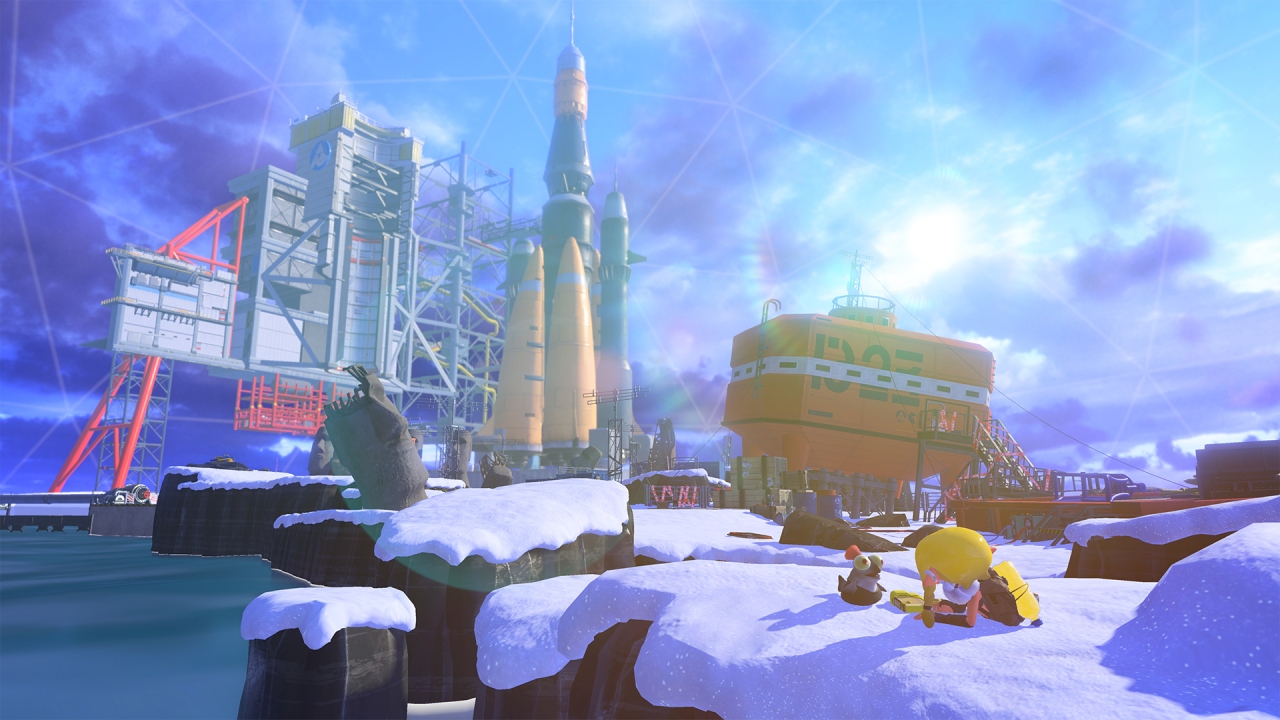
of course, i also have to talk about the game's single-player story mode, dubbed 'Return of the Mammalians'. i would describe this experience as, overall, a bit of a mixed bag, although one i still thoroughly enjoyed, and one where i'm willing to admit i have a bit of a skewed perspective on the whole deal. the story mode opens with some very deliberate signalling towards retreading old ground, putting you through familiar ordinary gauntlets to set your expectations, but quickly, things take a turn when you're immediately put up against recurring final boss, DJ Octavio. from here, the story takes a shift as you end up in Alterna, a mysterious underground world left behind by ancient human civilization.
i remember being rather shocked with the original Splatoon establishing this, but it feels like kind of an open secret at this point that, yes, the Splatoon series is a post-apocalyptic story, set in the wake of climate disaster wiping out humanity with a variety of sea life inheriting the Earth. it's kind of like how Kirby lore works - everyone acts all shocked when they find out Kirby fights a space god in his newest game or whatever, but like, we all know these things at this point, right? that's what Kirby does. they'll always pretend like it's not, but he does, and it's always a little impressive, but for those of us who have been around the block a few times, we know whatever cute buddy they give Kirby this time is gonna end up being some kind of space devil and/or mutant clone gone horribly wrong. Splatoon 3 hits a little weird for me, in the sense that it still feels like it was made with the intention of this being some kind of impressive twist, despite how open the games have always been about it - the secret Alternan logs you unlock by completing more and more levels essentially just recap that, yeah, humans sure did die out and then there started being Inklings. like, i get it.
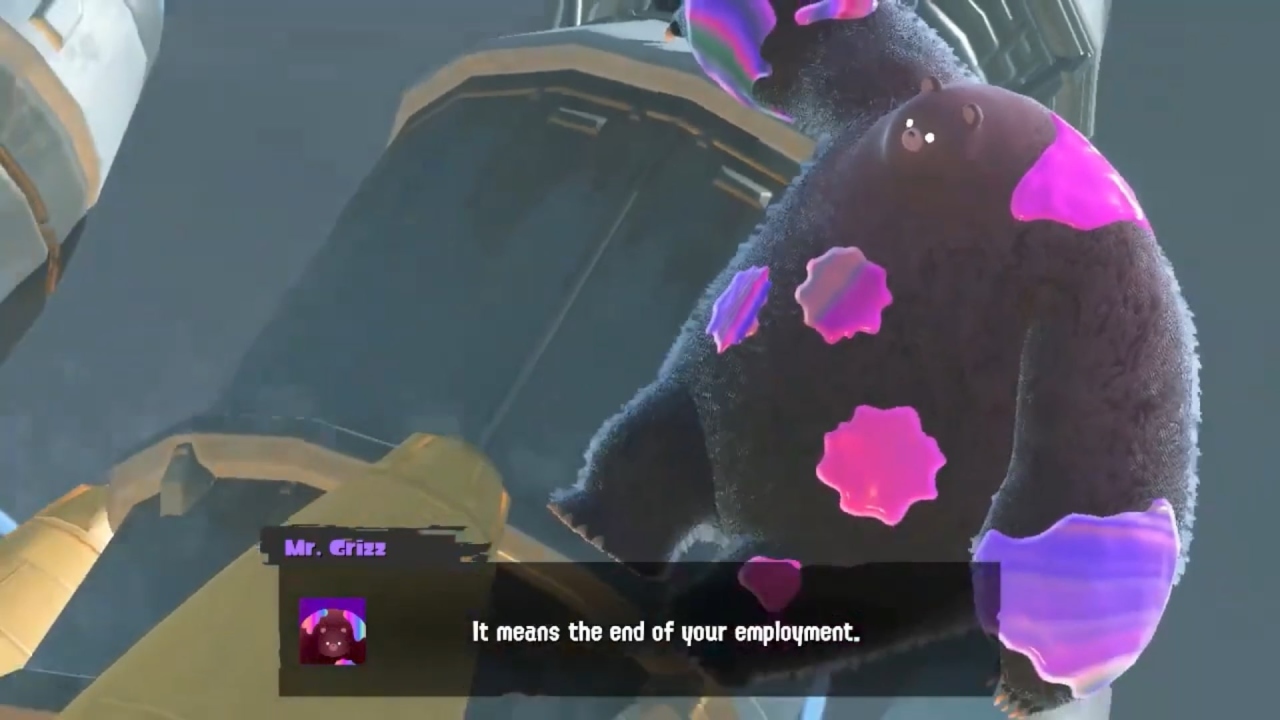
a similarly underwhelming element for me was the plot's true antagonist, Mr. Grizz. Mr. Grizz is a character who was introduced in the intervening years where i wasn't playing these games, but i was familiar enough with his whole schtick through the same sort of general osmosis with which i kept up with the rest of the series - he's a shady businessman, the mysterious benefactor behind the Salmon Run gamemode who collects the golden salmon eggs you gather for some unknown purpose while always remaining out of sight, only represented by a carved statue of a bear. shocking no one, Mr. Grizz is, in fact, just a bear - a giant, talking bear who wants to use those salmon eggs to forcibly convert all of Earth's new aquatic-based life back into mammals, represented visually by the hilarious image of an Inkling turned into a walking pile of hair. Mr. Grizz himself is a very charmingly written antagonist, speaking in overly sterile corporate terminology as he enacts his evil plan, but his presence in the story feels a little underbaked - he's kept something of a mystery, but you know fairly early on that he's the one behind all this, and he's not really an active participant in anything going on aside from being the vague endpoint you're chasing. he's got that 'love to hate' charm you crave, but it feels spread a little thin, perhaps. i do, however, acknowledge that maybe this point would have hit harder if i had, say, played the previous game, or not openly spoiled this one for myself before getting it. who's to say.
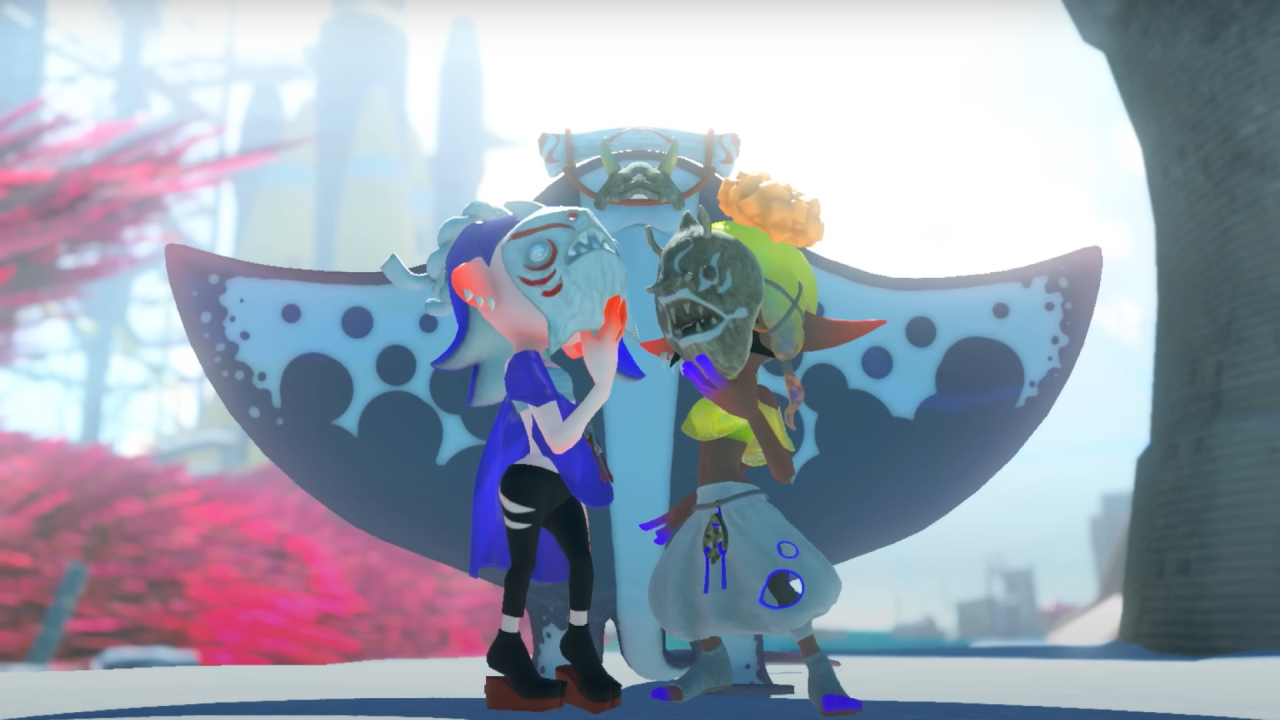
the major twist on the usual Splatoon plot beats that landed the best in terms of execution, then, has to be the inclusion of Deep Cut. each Splatoon game has had its signature idols, always present to deliver news or rally support for Splatfests, but Deep Cut actually gets a surprising presence in the story mode as antagonists, revealing a whole separate side to their partnership. they're not just musicians - they're also treasure hunters, and they see you as an intruder on a stash that's rightfully theirs. you could argue that by having Deep Cut act as the major bosses, the developers ended up depriving Mr. Grizz of some presence he could have really used, but it's hard to resist the Team Rocket-esque charm of the idol trio, especially when they immediately turn face at the climax. more than any other plot thread, i'm really hoping an inevitable Splatoon 4 follows up on them declaring Marie to be their new boss by having her be their talent agent or something. please. just get it in there somehow, i do not care how.
that was a lot of talk about the story of this game, but how's the actual moment-to-moment single-player gameplay? fairly satisfactory. Splatoon 3 skews its structure closer to the previous game's Octo Expansion, allowing for some more open pathing of how you want to approach levels, but frankly, it's been so long since i played the original game that any differences in that type of structure are going over my head a little bit. levels in Splatoon 3 tend towards being satisfying little bite-sized showcases of the game's menagerie of weapons, be it a Zipcaster grappling obstacle course or riding along Sonic Adventure-style rails to chase target balloons. there's not enough depth to necessarily revisit a lot of these challenge courses once you've played through them all, but it's a solid good time that'll get you acclimated and maybe help point you towards gear you might want to pick up for multiplayer.
the final thing i currently want to touch on from my weeks with this game so far is that, at last, after having been some level of Splatoon fan since day one, i finally got to participate in a Splatfest. they've refreshed the formula in quite a few ways for this new game, probably most prominently by, fittingly, making each Splatfest into a three-way debate, with each member of Deep Cut picking a side and with a new 'Tricolor Turf War' mode to match. unless i'm mistaken, it also seems like the standard is also to have Splatfests run for a full 48 hours, making them at least slightly more accessible than before.
the first full Splatfest (i say full, because that demo i skipped was a 'rock vs. paper vs. scissors' Splatfest) for Splatoon 3 was a bit of a bumpy ride, but it was still incredibly exciting getting to participate, especially since this particular Splatfest was unified across all regions rather than splitting its themes up like some previous events have done. the entire hub world of Splatsville gets in on the action - the fellow player models populating the city dance, buildings light up with neon signs and bustling jellyfish, and for the first half of the event, each member of Deep Cut rides through town on their own individual float, which you can follow around to listen to their particular 'slice' of their combined Splatfest theme, Anarchy Rainbow. there's a real sense of atmosphere they build around these events in a way that i think a lot of games miss the mark on. it's easy for a limited-time event to feel cynical or half-baked, like an excuse to funnel more players in for a weekend, but in Splatoon, these events really do feel like a natural extension of the world the game is trying to immerse you in.
on a gameplay front, things got a little rough. i appreciated the increased rate of unlocks during the Splatfest, but a few factors definitely need a little bit of fine tuning over the next few festivals. this particular Splatfest's theme was themed around what you would want to bring to a deserted island - 'gear, grub, or fun'. more than most Splatfests, this was one that kind of had a 'right' answer you could feel out, and so, Team Gear took up almost 60% of the playerbase, including myself. with numbers this lopsided, matchmaking felt noticablely loose with how it paired up players of different skill levels, and matches often felt lopsided, whether than was in my team's favor or against me. this isn't helped by Nintendo's somewhat confusing labels on the two types of Splatfest matchmaking - you would think 'Open' is for casual players and 'Pro' is for high stakes competiton, but 'Open' actually lets players band together with friends while 'Pro' enforces a single-player queue, meaning that 'Pro' is actually the much more balanced experience. Tricolor Turf Wars were present, but in response to complaints about their balancing from the demo, Nintendo dialed the rate of their appearance back to near-removal, which, when compounded with the unbalanced team numbers, meant i only got to play a single three-way battle a few short hours before the festival ended.
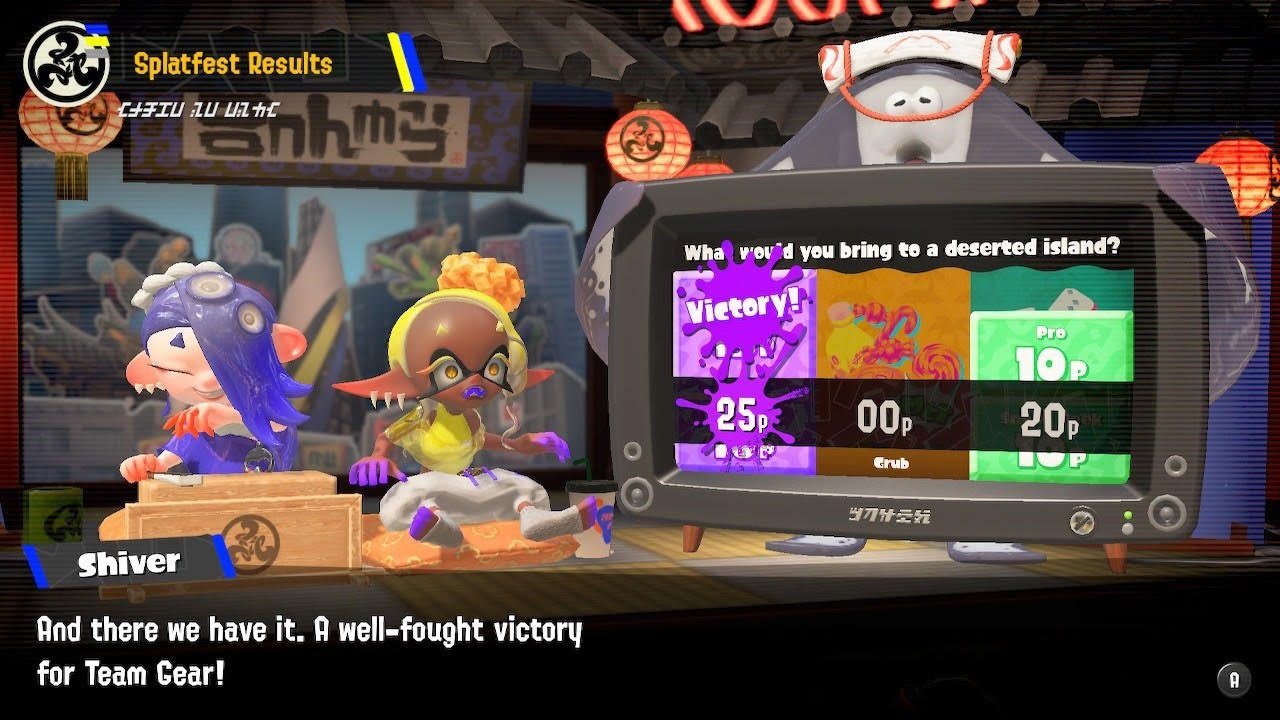
Team Gear won, for the record. yay. go gearheads.
so that's my overview on Splatoon 3, as it currently stands as of October 2022. Nintendo has already promised a full two years of post-launch support, and they're not being subtle about the fact that they're working on some single-player DLC, featuring fan-favorite idol pair Off the Hook from Splatoon 2. there'll be more Splatfests, more weapons, some kind of Salmon Run event that involves playing on normal Turf War maps as Salmonids invade Splatsville. it is a very real possibility that i'm here with you in a few months, or a few years, writing about this game again. Splatoon 3 certainly isn't going anywhere - having broken all previous records for any Nintendo game, hell, maybe any video game at all in its home country of Japan, selling almost 3.5 million copies over its first weekend. it still feels like it wasn't that long ago when i was worried that Splatoon would get lost, anchored to a half-dead console and underloved like so many Nintendo franchises before it. that doesn't feel possible anymore. Splatoon is big. bigger than i could have imagined. it's probably because of all those posts i made about it in 2014, right? i definitely did this one. you're welcome, folks.
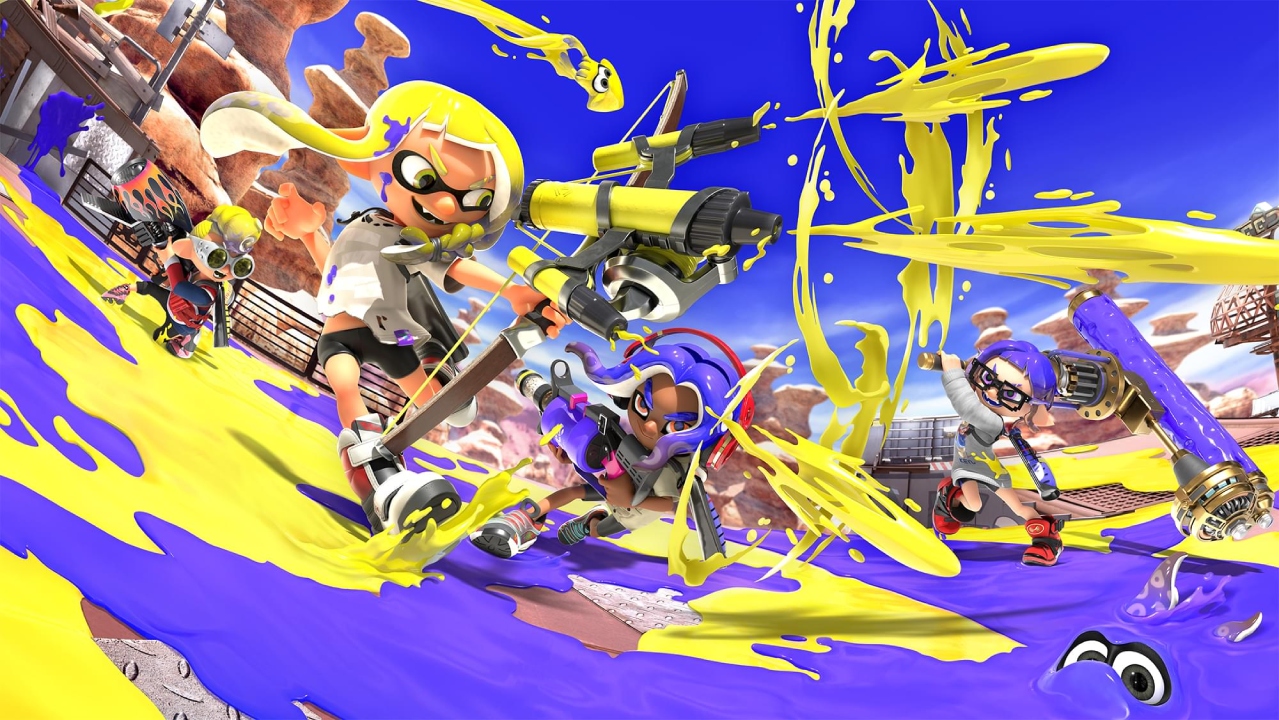
Splatoon 3 still isn't perfect. it still has all the same things i found to hinder my enjoyment of the original. it is still very much a Nintendo game, running on peer-to-peer connections that love to fall apart if you look at your console funny. there are still things i would change about this game in an instant with no second thoughts about it. but it's also still just as clever and charming as it was when these games first caught my eye. it's still thrilling and engaging, with that 'one more match' quality that keeps me up late playing, with a world i love to sink my teeth into and invest in.
Splatoon 3 is still Splatoon. sometimes, that still sucks. sometimes, that's still enough to be the best thing Nintendo has made in ages.


